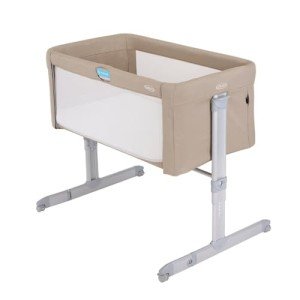15 Gifts For The Attachable Bedside Crib Lover In Your Life
Understanding Co-Sleeper Cribs: A Comprehensive Guide for New Parents
In the ever-evolving landscape of infant sleep solutions, co-sleeper cribs have actually garnered substantial attention amongst new parents. These specialized cribs provide an unique bridge between co-sleeping and safe sleep practices, offering advantages that resonate with both caretakers and infants. This post explores the intricacies of co-sleeper cribs, outlining their functions, benefits, considerations, and answering common questions to guide parents in making a notified choice.
What is a Co-Sleeper Crib?
A co-sleeper crib, likewise referred to as a bedside sleeper, is a kind of crib developed to securely attach or sit beside an adult bed. It permits infants to sleep near their parents without the dangers traditionally connected with adult bed-sharing. These cribs are available in numerous styles, however a lot of share a key function: one side that is lower, allowing easy reach to the baby while keeping them in their own designated sleeping space.
Key Features of Co-Sleeper Cribs
- Safe Attachment: Designed to safely connect to the adult bed, making sure stability.
- Adjustable Height: Height modification alternatives for smooth placing next to the adult mattress.
- Breathable Mesh Sides: Often geared up with breathable mesh sides to boost airflow.
- Compact Design: Takes up less space than traditional cribs, making them ideal for small rooms.
- Portable Options: Many co-sleeper cribs are light-weight or foldable, permitting easy motion and travel.
Benefits of Using a Co-Sleeper Crib
Co-sleeper cribs present several advantages that appeal to new parents, including:
- Enhanced Bonding: Proximity promotes bonding and can relieve nighttime feedings and reassuring.
- Streamlined Nighttime Feeding: Parents can easily feed or soothe their baby without needing to rise.
- Minimized Risk of Bed-Sharing Hazards: Co-sleepers create a much safer environment than traditional bed-sharing, reducing the threat of suffocation and falls.
- Motivation of Independent Sleep: Infants have their own sleep space, which promotes independent sleeping habits.
Factors to consider When Choosing a Co-Sleeper Crib
While co-sleeper cribs provide numerous benefits, there are also numerous factors to consider that parents should assess before purchasing:
- Safety Standards: Always make sure that the crib sticks to existing safety policies provided by companies such as the Consumer Product Safety Commission (CPSC).
- Size Compatibility: Measure the adult bed to ensure the co-sleeper will fit securely and comfortably together with it.
- Relieve of Use: Look for designs that assist in easy operation and availability, especially throughout nighttime.
- Convertible Options: Some co-sleepers offer the flexibility to transform into a conventional crib once the kid outgrows them, which can be an affordable choice.
Leading Co-Sleeper Cribs on the marketplace
To help navigate the abundance of alternatives readily available, here's a table showcasing some popular co-sleeper cribs in addition to their standout functions:
Brand
Design
Features
Price Range
Arm's Reach
Perfect Arc Crib
Adjustable height, removable side
₤ 150 – ₤ 230
Babybay
Initial Co-Sleeper
Made of sustainable wood, includes mattress
₤ 240 – ₤ 300
Chicco
Next2Me Magic
Easy side access, foldable design
₤ 200 – ₤ 280
Cuddle Me
Organic Co-Sleeper
Soft, comfortable contours; portable
₤ 120 – ₤ 180
HALO
BassiNest
360-degree rotating, height-adjustable
₤ 250 – ₤ 350
Tips for Using a Co-Sleeper Crib
- Positioning: Place the co-sleeper next to the bed at the very same height level for security.
- Follow Safe Sleep Practices: Ensure the crib is set up according to standards to minimize risks. This includes preventing loose bed linen and keeping the bed mattress firm.
- Frequently Check Security: Periodically examine the attachment between the co-sleeper and the adult bed to ensure it stays safe and secure and stable.
Often Asked Questions (FAQs)
1. Are co-sleeper cribs safe?Yes, when
utilized according to the maker's directions and security standards, co-sleeper cribs are thought about a safe option to traditional bed-sharing.
**2. For how long can official source use a co-sleeper crib?Most co-sleeper cribs are designed for infants approximately 5-6 months old, however examine specific product requirements for age and weight limits. 3. Do co-sleeper cribs feature mattresses?Many co-sleeper cribs come with included bed mattress, however confirm this before purchase. Ensure any additional bed mattress fulfills safety requirements. 4. Can a co-sleeper crib be used for twins?There are co-sleeper cribs developed for twins, but these models might be less common. Always inspect the size and weight limitations. 5. Must I use a co-sleeper crib for naps?Absolutely! Co-sleepers work well for both nighttime sleeping and naps, providing a consistent sleep environment for infants. Co-sleeper cribs use an efficient and safe compromise
for new parents eager to keep their infant close while keeping a safe sleeping environment. By comprehending their functions, advantages, and
security considerations, parents can make informed choices that deal with their household's requirements. Whether you're looking for convenience throughout nighttime feedings or a method to build a strong early bond, a co-sleeper crib may simply be the best choice for you and your child.  **
**